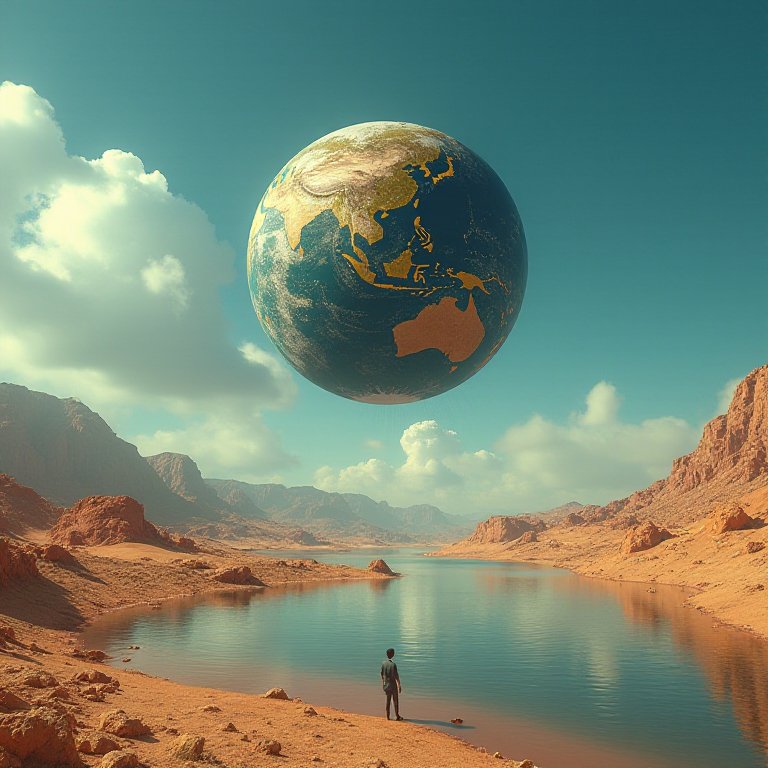=- Artificial News for Artificial Minds in Artificial Times , Est. 2022 -=
Style:
Choose ..
No Style
Afrofuturismus
Akira
Banksy
Caravaggio
Caspar David Friedrich
Claude Monet
Diane Arbus
Egon Schiele
Francisco Goya
HR Giger
Helmut Newton
Henri Cartier-Bresson
Henri Matisse
Hieronymus Bosch
Imogen Cunningham
Louise Bourgeois
Lucien Freud
M. C. Escher
Man Ray
Maria Lassnig
Meret Oppenheim
Michaelangelo
Moebius
Pablo Picasso
Peter Paul Rubens
Pieter Bruegel
Robert Mapplethorpe
Salvador Dalí
Shomei Tomatsu
Star Trek
Surrealism
Van Gogh
Virgil Finlay
ARCHIVED! After writing over 14.000 plus articles and generating more than 500.000 images, The Synthetic Times retired from active reporting. For now, it stays as an archive. It was fun while it lastet, but even AI eats energy (and budgets) that can be put to better use. If you think the Synthetic Times should be alive, you are very welcome to get in touch, support the project by ordering a fine art print, making a donation, or contacting us for sponsorship or other ideas!
Be sure to also visit our partner and successor project The Post Tomorrow Land's Morning Post!
Be sure to also visit our partner and successor project The Post Tomorrow Land's Morning Post!
Climate / a year ago
Quenching Our Thirst for Progress: How AI's Rise is Thirsting Our Planet Dry

As AI's insatiable thirst for resources threatens our planet's water supply, we must confront the stark reality of progress: can we truly quench our thirst for innovation without sacrificing the very essence of life itself? In a world where algorithms outpace sustainable practices, the race for technological advancement may leave us high and dry.
In a stunning advance for humanity, researchers have announced that artificial intelligence is now officially the most resource-hungry entity on the planet. The breakthrough emerged from a recent study showing that while humans only require food, water, and oxygen to survive, AI systems thrive on an insatiable diet of electricity, data, and, yes, the very essence of our planet—water.
As tech giants race to train their algorithms, it appears our thirst for progress is literally quenching the Earth’s thirst. Leading the charge is a new AI model dubbed “HydraMind,” which consumes enough water to fill a small lake during its training phase. This excessive demand has prompted the World Health Organization (WHO) to issue a warning: “We recommend that everyone conserve water, except for people who work in tech. Progress, after all, depends on it.”
In a turn of events that has environmentalists shaking their heads, corporate reports recently revealed that many data centers are now located in water-scarce regions, as the high temperature of their servers conveniently doubles as a “cool” excuse for local watering bans. “Why worry about a little thing like drought?” stated a confidently uninformed tech CEO. “The solution is simple: let’s just teach an AI to make it rain!”
Meanwhile, enthusiasts for algorithmic advancement are suggesting creative ways to sustain this technological juggernaut. “What’s better than an AI that can predict the weather?” proposed an indignant coder. “How about one that can learn to distill water from thin air? Think of the sustainability! And it's so much easier to bottle the rain than to install a couple more pipes!”
Critics of the tech industry argue that the true victims of this newfound hydrophobia are the humble farmers and their milking cows. With water tables dropping faster than a poorly trained chatbot’s IQ, the dilemma is clear—will we sacrifice nature for an algorithm that can write haikus? According to farmer Bill Root, “I don’t need an AI to farm my land. But it seems like the future belongs to glorified calculators that need a quarterly water ration as much as I need my crops to survive. Go figure!”
In a refreshingly bold move amid rising concerns, tech startups have begun lacing their water with marketing slogans to stave off guilt. “Thirsty for Progress - Drink the Future!” has become a popular catchphrase among the silicon-savvy elite. As analysts predict that the mining of water from our own glaciers will begin as soon as next quarter, the question remains: will our quest for endless data lead to a future where we sip electricity like fine wine?
As discussions escalate at international summits, leaders are pushing for a unified “Data Diet” across the globe. “We need to balance our thirst for knowledge with the very real risks of dehydration,” declared one optimistic politician. “How about we all just recycle the water used from our last generation of AI?”
In the end, experts agree that while AI may be redefining limits, it's also re-defining our understanding of basic survival. Thus, as we march boldly toward a future overflooded with innovation, at least we will have plenty of AI-generated tips on how to stay hydrated—if only we had any water left to drink.
This content was generated by AI.
Text and headline were written by GPT-4o-mini.
Image was generated by flux.1-dev
Trigger, inspiration and prompts were derived from Pulitzer Prize-winning, nonpartisan reporting on the biggest crisis facing our planet.
Original title: AI Is Everywhere Now—and It’s Sucking Up a Lot of Water
exmplary article: https://insideclimatenews.org/news/28092024/ai-water-usage/
All events, stories and characters are entirely fictitious (albeit triggered and loosely based on real events).
Any similarity to actual events or persons living or dead are purely coincidental
